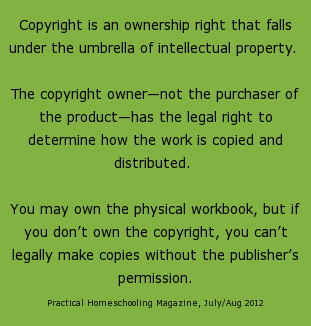When Frugal Is Illegal: Here’s How to Avoid the Copyright Trap
By Kim Kautzer
Printed in Practical Homeschooling #104, 2012.
 When and how saving money by copying teaching materials is a legal, ethical, and wise thing to do
When and how saving money by copying teaching materials is a legal, ethical, and wise thing to do

| 
|
We at PHS realize this is a very emotional issue for many people. Our
intent is not to make anyone feel bad, but to help our readers
understand their rights and responsibilities under the law. Remember,
you can always contact a publisher, explain your situation, and ask
for an exception to be made in your case. “Native” homeschool
publishers, such as those whose ads you find in PHS, are more likely
to be open to such appeals.—Editor
|
| Is This Legal? |
|
Which of these well-meaning moms is actually doing the right thing?
- A mom of seven, Jane is always looking for ways to be frugal,
such as having her children use page-protector overlays and wipe-off
markers instead of writing in their workbooks. This way, she doesn’t
have to buy extra copies.
- Isabel orders a magazine subscription that comes with a free
e-book. The e-book normally sells for $10, but since it was free, she
forwards a copy to several friends.
- With an unemployed husband, Amy needs money for curricula. Since
her 7-year-old did his math problems on paper instead of in his
consumable workbook, she decides to resell the math book.
- Dawn is so excited about her new lesson-planning software that
she shares the DVD with her best friend.
- At a homeschool convention, Becky picks up a history text. It’s
not a workbook, so her son writes his answers in a spiral notebook.
Becky plans to reuse the book with her daughter next year, and then
she’ll sell it.
Take this quiz and write down your answers. Then take it again after
reading this article. Answers are at the end of the article.
|
As a whole, homeschoolers are a thrifty bunch. Feeding, clothing, and
educating a family—usually on one income—presents challenges, and
prudent moms are always searching for ways to save.
To cut curriculum costs, homeschoolers share e-books, scour used
curriculum sales, or copy fill-in-the-blank workbooks. Confused by
copyrights, they’re often unaware that some of these activities are
legal . . . and some are not.
The Issue of Ownership
In our world, the concept of ownership goes something like this: I
bought it. It’s mine. Therefore, I can use it any way I want.
However, there are laws that supersede personal ownership. For
example:
- It’s illegal to park next to a fire hydrant even when you own the
car.
- Though you’re the owner, your homeowner’s association can forbid
you to paint your house blue.
We understand these laws. We may not like them, but we typically obey.
Why, then, is it so hard to wrap our heads around copyright?
Maybe because we’re dealing with something intangible: creations of
the mind known as intellectual property.
According to the US Patent and Trademark Office, intellectual property
like a book, e-book, or CD “is an asset just like your home, your car,
or your bank account. Just like other kinds of property, intellectual
property needs to be protected from unauthorized use.”
Copyright is an ownership right that falls under the umbrella of
intellectual property. The copyright owner—not the purchaser of the
product—has the legal right to determine how the work is copied and
distributed. You may own the physical workbook, but if you don’t own
the copyright, you can’t legally make copies without the publisher’s
permission.
Copy Rights & Wrongs
 Who wants to be called a pirate or a criminal? Yet each time we make
an unauthorized copy of a worksheet or DVD, we’re taking something
that’s not ours: We’re engaging in the illegal act of piracy and
stealing the copyright owner’s rights to the work.
Who wants to be called a pirate or a criminal? Yet each time we make
an unauthorized copy of a worksheet or DVD, we’re taking something
that’s not ours: We’re engaging in the illegal act of piracy and
stealing the copyright owner’s rights to the work.
As Christians, most of us would never dream of stealing, yet we often
find ways to justify crossing that copyright line:
Money is so tight.
Moral truths do not change with personal circumstances. Don’t let your
financial situation dictate your morality or your actions. It takes
creativity to find curriculum frugally, but you can educate without
compromising your integrity. If finances are an issue, use websites
like Freelyeducate.com or homeschoolcollegeusa.com to plan a low- or no-cost education for your
children.
My kids didn’t write in the book.
This is the single least-known and least-understood copyright rule.
Unless the publisher gives permission for purchasers to make multiple
copies, you must buy a separate workbook for each child. Whether your
children write directly in the workbook, on notebook paper, or use an
acetate overlay, a consumable workbook that has been used in any way,
even if no writing appears on its pages, is still “used” and may not
be reused without violating copyright law.
What about “partly used” workbooks?
Noted intellectual-property attorney Susan Spann says: “It
is permissible to use the unused portions of the workbook (minus the
used pages) for another child. The used portions should be discarded.
Also, it is legal to give a workbook to someone else if you only used
a few pages, but you should remove the used pages from the book to
ensure the new owner does not violate copyright by reusing the pages.”
I want to preserve the original and resell it.
Only non-consumable textbooks may be resold or shared. You can legally
make one archival copy of a copyrighted work in case the original is
destroyed, but “archival copies can’t be used as ‘second copies’ or
given away to another person,” says Susan Spann.
I don’t think it’s unethical to photocopy workbooks. Just because
they’re sold as a consumable resource doesn’t mean they need to be
used as a consumable.
The US Copyright Office states: “There shall be no copying of or from
works intended to be ‘consumable.’” We can certainly have personal
beliefs about this sensitive topic, but what we “feel” or “think” does
not trump the law. We’re obligated to use the materials as specified
by the copyright.
Spann adds, “Although the physical book belongs to the buyer, the
intellectual property rights (including the right to control copying)
… belong to the copyright holder. Illegal copying is infringement
regardless of the purchaser’s contrary belief.”
The publisher charges too much.
If a product is out of my price range, I have the right not to
purchase it. I don’t have the right to devise a plan to get that
product illegally.
Sadly, we have little idea what publishing entails. We don’t see the
hours spent researching and writing curriculum. We don’t realize what
it costs to hire a graphic designer, to print books, to advertise, or
to exhibit at conventions. We only know we bought a $30 workbook and
want the freedom to make copies as we please.
Consider: “the worker deserves his wages” (Luke 10:7), and that
includes writers and publishers too. They have every right to make a
living from product sales, and we do them a disservice—as well as a
legal wrong—each time we copy or share their work improperly.
The publisher is unreasonable. What harm can come from using this with
all my kids?
A consumable workbook cannot be shared by siblings without the
publisher’s permission. Copyright law requires buying a workbook for
each child unless the workbook itself says otherwise.
Grumble though we may, it’s not our call to determine the fairness of
a copyright license. If we don’t like the publisher’s policy—or aren’t
willing to abide by it—we must choose a different curriculum that
grants permission to make unlimited copies.
Speaking of permission, don’t be afraid to ask! Many small publishers
will gladly work with homeschoolers.
Copyright and the Christian
For Christian homeschoolers, here are some additional thoughts.
Copyright is not specifically mentioned in the Bible, but God expects
us to obey the laws of the land. “Submit yourselves for the Lord’s
sake to every authority instituted among men” (I Peter 2:13). Paul
adds that we don’t abide by the law just to avoid punishment, “but
also as a matter of conscience” (Romans 13.5).
Titus says: “[B]e subject to rulers, to authorities, to be obedient …
showing every consideration for all men” (Titus 3:1-2), and “be
careful to engage in good deeds” (Titus 3:8).
Engaging in “good deeds” (respecting copyrights) and “showing every
consideration for [authors and publishers]” honors God and
demonstrates our willingness to subject ourselves to authorities
placed over us.
God calls Christians to the highest standard. Ignoring copyright law
dishonors Him and damages our testimony. Is that frugal—but
illegal—stack of copies really worth it?
Kim Kautzer, veteran homeschooler and author of WriteShop, loves to
help parents feel more confident about teaching writing. The Kautzers
live in Southern California, where they enjoy their empty nest and
seven spunky grandchildren.
Answers to sidebar “Is This Legal?” quiz: 1. No. 2. No. 3. No. 4. No.
5. Yes.